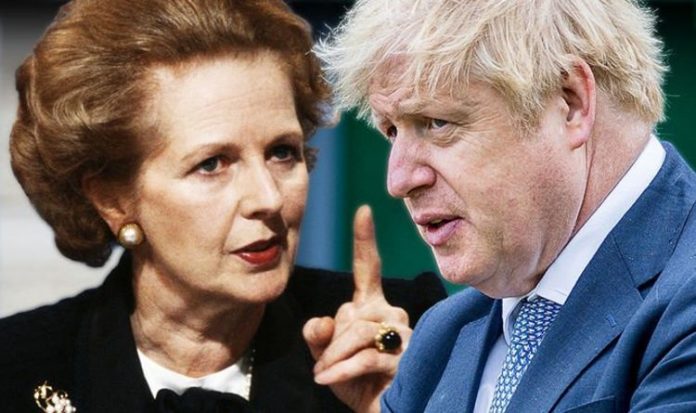The Internal Market Bill passed its first hurdle in the Commons last week as MPs voted in favour by 340 votes to 263, but not without controversy. It addresses the Northern Ireland Protocol – an element of the withdrawal agreement designed to prevent a hard border returning to the island of Ireland. The bill seeks to give powers to UK ministers so they can modify or “disapply” rules relating to the movement of goods – Northern Ireland Secretary Brandon Lewis admitted this could break international law.
The move has infuriated the EU as Prime Minister Boris Johnson attempts to jump hurdles laid by the withdrawal agreement – which the Conservatives passed through Parliament this year.
The Prime Minister has also faced pressure from his own party, as MP and former Attorney General Geoffrey Cox contrasts Mr Johnson with former Prime Minister Margaret Thatcher.
He told the Chopper Politics podcast: “The British strength is based on its faithful and rigorous observance of the rule of law, and on an international and historic reputation for keeping its word.
“It is beneath the dignity of the Crown to renege on an agreement it solemnly undertook just nine months ago. It is a matter of national honour.
“I don’t have any problem with the Government using emergency powers providing they use those powers in circumstances that the law would permit.
“All I’m arguing is that a government should act within the law. Can you imagine Margaret Thatcher doing anything else?
“I don’t think we should be acting like the strongman, because we all know how that ends up.”
The politician and barrister added that while he supports Britain leaving the EU, he cannot endorse breaking the law.
READ MORE: EU split as Macron and Varadkar slam trade deal – ‘They lied to us!’
Mr Cox and Mr Johnson were embroiled in a legal row together last year when Parliament was prorogued.
Mr Johnson was trying to see his Brexit withdrawal agreement with the EU through the Commons, but at the time the Tories only had a minority government.
Many MPs from the opposition side of the House saw the suspension of Parliament as a tactic to force through the deal without scrutiny.
Mr Johnson and his ministers defended the prorogation of Parliament as a routine political process that ordinarily follows the selection of a new Prime Minister and would allow the Government to refocus on a legislative agenda.
Last September, the Supreme Court ruled that the move was unlawful.
Delivering judgement, Lady Hale said: “The question arises in circumstances which have never arisen before and are unlikely to arise again.”
Documents leaked last year showed that Mr Cox, who was Attorney General at the time, advised the Government that prorogation was “lawful and within the constitution”.







